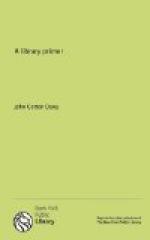It is within the scope of the library to improve the taste in reading among the pupils of the schools by compiling lists of the best books upon the shelves, and distributing these lists to the pupils. Such lists may be classified as suitable to different grades or ages, or by subjects, as, History of different countries or epochs, Biography, Travels, Nature work, Fiction, etc.
The possible good that may be achieved in this way is immeasurable. Although, according to Dogberry, to write and read comes by nature, we must remember that a taste for good reading is not innate but acquired, and that it is not ordinarily acquired under unfavorable conditions. To ensure the acquirement of this taste by the child, good reading must be made as accessible as the bad, the librarian and the teacher must conspire to put good reading, interesting reading, elevating reading in his way. The well-read person is an educated person. The taste for good reading once acquired is permanent. There is little danger of backsliding. It grows with indulgence. One writer says: No man having once tasted good food or good wine, or even good tobacco, ever voluntarily turns to an inferior article. So with our reading habits; a taste for good reading once acquired becomes a joy forever.
Teachers do not realize, as does the librarian, the low tone of the reading taste of the community. When they fully understand this, together with the fact that the acquirement of a reading habit and a love for good literature are largely dependent, in a majority of cases, upon the public school training, then will the librarian have to bestir himself to supply the demand for good books made by the school.
The habit thus formed, the taste thus acquired, will be of infinitely more value to them than the information gained. The latter may soon be forgotten, the former will stay with them through life; but the influence of good books taken into the homes of our school children, from the library or from the school, does not stop with the children themselves. It is impossible that such books should go into even an ignorant, uncouth, unlettered family without exerting an elevating and refining influence.
Thus the school opens to the library the broadest field for doing the greatest good to the greatest number, the shortest avenue to the masses.
But the consciousness of good done will not be the only reward for the library. The reflex action upon the library of this intimate connection with the school will be highly beneficial. A generation will grow up trained to associate the library and the school as instrumentalities of public education, demanding alike its moral and financial support, a generation that in town meetings and in city councils will advocate generous appropriations for the public library as well as for the public school.
Thus, your bread cast upon the waters shall return unto you after many days.




